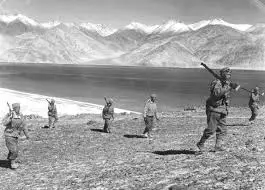When Parliament convened in 1962 amid China war, and PM Nehru faced Opposition questions

The year 1962 marked one of the darkest chapters in India’s post-independence history — the brief but brutal Sino-Indian War. Against the backdrop of military setbacks and national shock, the Indian Parliament convened to confront the crisis. Prime Minister Jawaharlal Nehru, the architect of independent India’s foreign policy and a towering political figure, faced an unprecedented wave of opposition scrutiny and criticism.
Context of the 1962 China War
Tensions between India and China had been simmering since the late 1950s over disputed Himalayan borders, particularly in Aksai Chin and Arunachal Pradesh (then the North-East Frontier Agency). Despite several rounds of diplomatic talks, the situation deteriorated, culminating in a full-scale war that began in October 1962. China’s swift and overwhelming military advances exposed glaring weaknesses in India’s defense preparedness.
Parliament Convenes Amid Crisis
In late 1962, as news of military defeats spread, the Indian Parliament was summoned for an emergency session. This was a critical moment: the nation demanded answers, accountability, and leadership. The atmosphere in the Lok Sabha and Rajya Sabha was tense and charged.
Opposition leaders seized the opportunity to question the government’s handling of the conflict. They criticized the lack of military preparedness, inadequate intelligence, and Nehru’s policy of “Hindi-Chini Bhai-Bhai” (India and China are brothers), which seemed naive in hindsight.
Opposition’s Sharp Questions and Demands
The opposition, led by stalwarts like S. Nijalingappa of the Congress (O), Acharya Kripalani, and members from the Communist Party of India and the Bharatiya Jana Sangh, raised pointed questions:
- Why was India unprepared despite clear signs of Chinese aggression?
Opposition members argued that the government had ignored multiple intelligence warnings and failed to strengthen border defenses. - Was Nehru’s policy of friendship with China a diplomatic failure?
They challenged Nehru’s idealistic approach and blamed him for underestimating China’s expansionist ambitions. - Who was responsible for the lapses in military leadership and logistics?
Questions arose over the role of the Defence Ministry and military commanders, demanding transparency and accountability. - What steps was the government taking to safeguard India’s sovereignty going forward?
Opposition members demanded a clear strategy and immediate reforms to prevent such a debacle in the future.
Nehru’s Response
Prime Minister Nehru, known for his eloquence and calm demeanor, addressed the Parliament with a mix of sorrow and resolve. He acknowledged the severity of the situation and admitted that India had been caught off guard. Nehru took moral responsibility but also emphasized the complexity of the international situation.
He defended the diplomatic approach of peace and dialogue but recognized that India must strengthen its defenses. Nehru promised a thorough inquiry and reforms to ensure national security. His speeches during this period reflected a deep personal and political crisis but also a commitment to rebuild.
Impact on Indian Politics and Policy
The 1962 Parliament session was a turning point in India’s political landscape. The Opposition’s relentless questioning pushed the government to reevaluate its defense policies and intelligence apparatus. It led to the establishment of more robust border management and military modernization.
Politically, Nehru’s standing suffered, with some sections of the public and political class questioning his leadership. The war exposed vulnerabilities in India’s foreign policy assumptions and became a lesson in balancing idealism with pragmatism.






